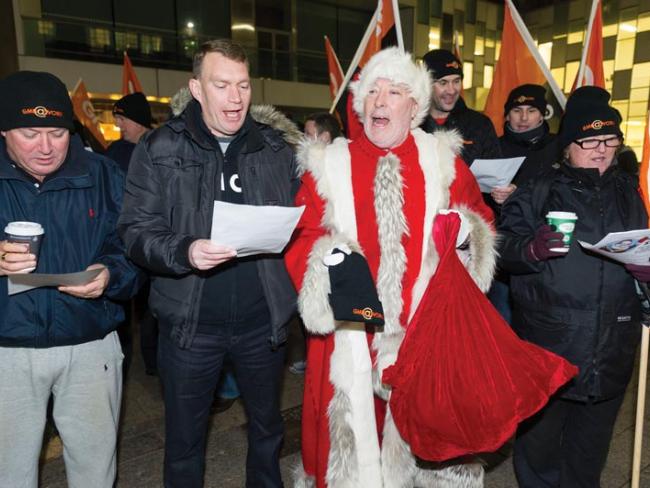
GMB members held a “Santa demo” at Barking and Dagenham’s cabinet meeting before Christmas as part of their fight. Santa is giving out GMB beanie hats, which GMB members had been told not to wear. Photo: Andrew Wiard/www.andrew-wiard.info
The short dispute among waste collection vehicle drivers in the London Borough of Barking and Dagenham ended recently when GMB members, who had undertaken a series of strikes which began in March 2015, were instructed to return to work by their union.
The impact of the strike had diminished over recent weeks with dwindling numbers of GMB members opting to continue the action. Most had returned to work and accepted a deal that had already been negotiated by Unison and Unite following talks at ACAS.
Overtime
The dispute arose in February 2015 after a proposal by the Labour council to reduce to 15 minutes a 30-minute contractual overtime payment made to the vehicle drivers, with effect from 14 July 2015. The proposal affected around 120 drivers, who stood to lose £1,000 a year, and was part of an extensive cuts programme for 2014/15 agreed by the council’s cabinet in December 2014.
Prestart checks are a legal requirement, but most councils include them in the normal working day and not as overtime. The council wanted to avoid any equal pay claim risk, so other vehicle drivers responsible for vehicle checks in passenger transport needed to receive the 15 minutes overtime.
The GMB did not want to enter into negotiations around the issue and proceeded to ballot for strike action in February 2015. Although most of the workers were GMB members, the union took this course of action without discussing a strategy with Unison and Unite, which also had members in the depots.
The council responded by withdrawing the 15-minute prestart payment for those striking, and wrote to everyone affected asking them to sign a contract variation in April which would give them back the 15 minutes.
Other unions
Unite and Unison members also wanted to challenge the proposals but chose to take a different approach. Unison registered a dispute with a view to going into talks.
By April, the GMB had escalated strike action, the council was struggling to maintain the refuse collection service and matters were becoming increasingly acrimonious.
The GMB was persuaded to attend ACAS to attempt to negotiate a settlement but engagement was problematic: the union was unwilling to suspend strike action without a firm offer from the council, which wouldn’t move unless the action was suspended. At the council’s request, Unison and Unite also attended the talks but, at least initially, were little more than passive observers of the process.
After further days of talks, Unison and Unite agree a negotiated settlement acceptable to their members. But the GMB would not agree, and continued the strike.
Backed into a corner
The GMB had backed itself into a corner. The laudable intention to protect members’ pay from being cut had resulted in a disagreement between unions at the negotiating table and divisions among the workers.
Further, the council could now gain the upper hand by portraying the GMB as intransigent. It trumpeted the fact that a refuse service had been maintained, with minor inconvenience to residents, funded by the money it had saved by withholding the pay of the striking workers.
The local press, which had mostly taken a benign view of the strike, now helped tip the balance by showing that the much-touted prestart vehicle checks could be done in less than 10 minutes, not the 30 minutes the GMB claimed.
With many of the strikers drifting back to work during May, seemingly unwilling to accept the escalation of strike action that their leadership demanded, it was only a matter of time before the inevitable conclusion. On 1 June, the GMB announced the remaining 30 strikers would return to work while it and the council held talks at ACAS “with the view of improving relations between the two parties”.
Improving relations between the three unions, GMB, Unison and Unite, may be a harder task. But it will need to be done if workers are to be able to respond to employer tactics that seek to undermine our collective strength and resolve.
The Barking and Dagenham dispute has much wider ramifications. Dominated for years by the GMB (most of the councillors are GMB-sponsored and GMB-loyal) exercising control through the Labour Party and trade union branches, the council is now erupting into open warfare between factions inside the GMB.
The waste dispute was part of that internal Labour Party – GMB internecine war complicated by central government cuts slashing local labour budgets.
Barking and Dagenham never was a redoubt of municipal socialism. But with sprawling depressed ex-council estates, the remnants of Ford, poverty, unemployment and migration, there is more at stake here than mere factions left and right in the GMB, or personalised politics of Labour Party figureheads.
How do those who are attached to local control resist the central government juggernaut which intends to sweep away all opposition irrespective of how limited, short-sighted or parochial? Unity must be part of the answer.
